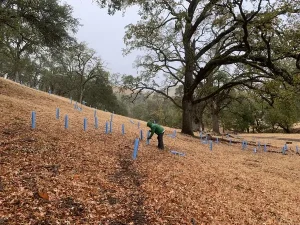What Does It Mean to Steward the Land?
Stewardship Is Forever
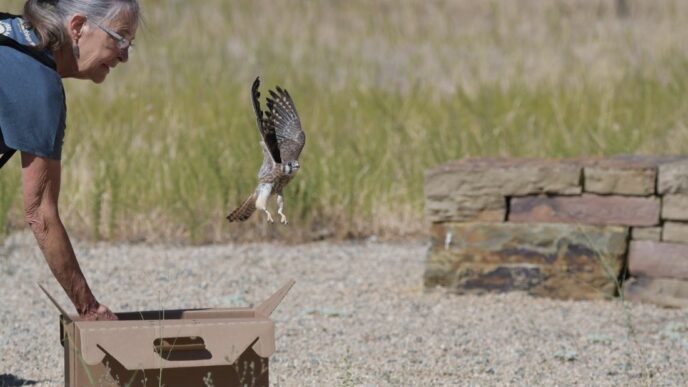
Save Mount Diablo has been stewarding open space since our inception in 1971. In essence, to steward is to be responsible for the well-being of some entity. For Save Mount Diablo, stewardship means managing, protecting, and celebrating the land.
Land conservation in perpetuity is an integral part of Save Mount Diablo’s mission, and as a landowner, we have the responsibility to conserve the natural landscape. Mount Diablo and its surrounding foothills are the focus of our stewardship activities.
Why We Steward the Land
Each of Save Mount Diablo’s Properties Requires Care
To ensure open space remains open for the long run, Save Mount Diablo works with collaborating agencies and private landowners to protect and restore the land. When possible, Save Mount Diablo acquires land, then turns it over to open space agencies.
In preparation for transferring property to an open space agency, Save Mount Diablo stewards the land, enhancing the conservation values of the properties we purchase.
Save Mount Diablo also partners with open space agencies and private landowners to manage and restore lands for the long term.
We Rely on Stewardship Volunteers
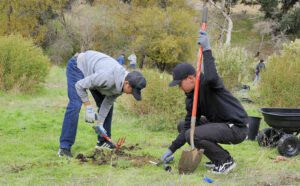
Volunteers engage in planting, watering, habitat restoration, creek cleanups, non-native plant removal, debris removal, fence building, trail construction, and other work projects.
A newly acquired property may need extensive cleanup—old, deteriorating fencing is cleared away, and any debris that might have accumulated on the property is removed, returning the land to its natural state.
In some cases, fencing is added to protect creeks and ponds and help restore natural habitat. With the support of volunteers, Save Mount Diablo maintains the integrity of wildlife habitat, scenic viewsheds, waterways, and recreational corridors through land stewardship activities.
Stewardship staff and volunteers spend thousands of hours each year participating in hands-on land management activities. From monitoring properties on a monthly basis to cleaning up dump sites to re-establishing native bunchgrasses, Save Mount Diablo’s stewards perform a variety of tasks aimed at preserving natural resources on and around the mountain.
How We Steward the Land
Our Core Efforts
Habitat Restoration
Save Mount Diablo recognizes that ecological restoration has become increasingly important for the viability of natural resources.
Current development pressures threaten biodiversity and pose the highest risk in our region to rare, endemic, and sensitive species. It is our responsibility as land managers to protect and enhance our lands whenever possible.
Here are some examples of our habitat restoration work:
- Restoring floodplains
- Restoring native grasslands
- Protecting and planting 10,000 trees and plants in 10 years
- Demos and cleanup (Coastal Cleanup Day, trash removal, fence removal)
- Maintaining and building wildlife corridors
- Building, installing, and maintaining nest boxes for American kestrels
- Releasing rehabilitated American kestrels
- Planting milkweeds to support the declining monarch population
- Releasing rehabilitated ground squirrels
- Removing accumulated ranching debris from wildlife habitat
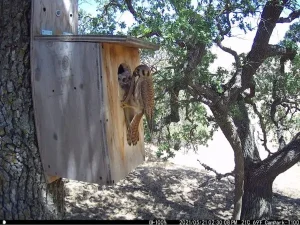
Motion-activated cameras allow us to monitor the food habits of American kestrels. Photo: Sean Burke.
Monitoring Properties, Conservation Easements, Habitat, and Wildlife
With property holdings of about 2,000 acres, having eyes and ears on the ground is crucial. Stewardship staff and volunteers monitor Save Mount Diablo properties on a monthly basis, informing annual work plans and overall management priorities.
Monthly monitoring reports ensure a consistent record of land stewardship and help make sure operations are consistent with our land conservation mission.
We have installed wildlife cameras on many of our properties to track presence and movement of wildlife.
We’ve protected many properties through conservation easements.
A conservation easement is a legal agreement between a landowner and a qualified organization such as a nonprofit land trust, like us. It restricts development of the land to protect it for public benefit.
Our Conservation Easements:
Some habitat projects that we’re monitoring include East Bay milkweed areas, Knobcone Point dieback areas, and Marsh Creek stream monitoring.
We also monitor our properties for invasive plants, such as artichoke thistle, milk thistle, medusa head, stinkwort, barbed goat grass, perennial pepperweed, poison hemlock, and others.
And we do botanical surveys on our properties and on other strategic lands, such as through our BioBlitz.
Rangeland Management
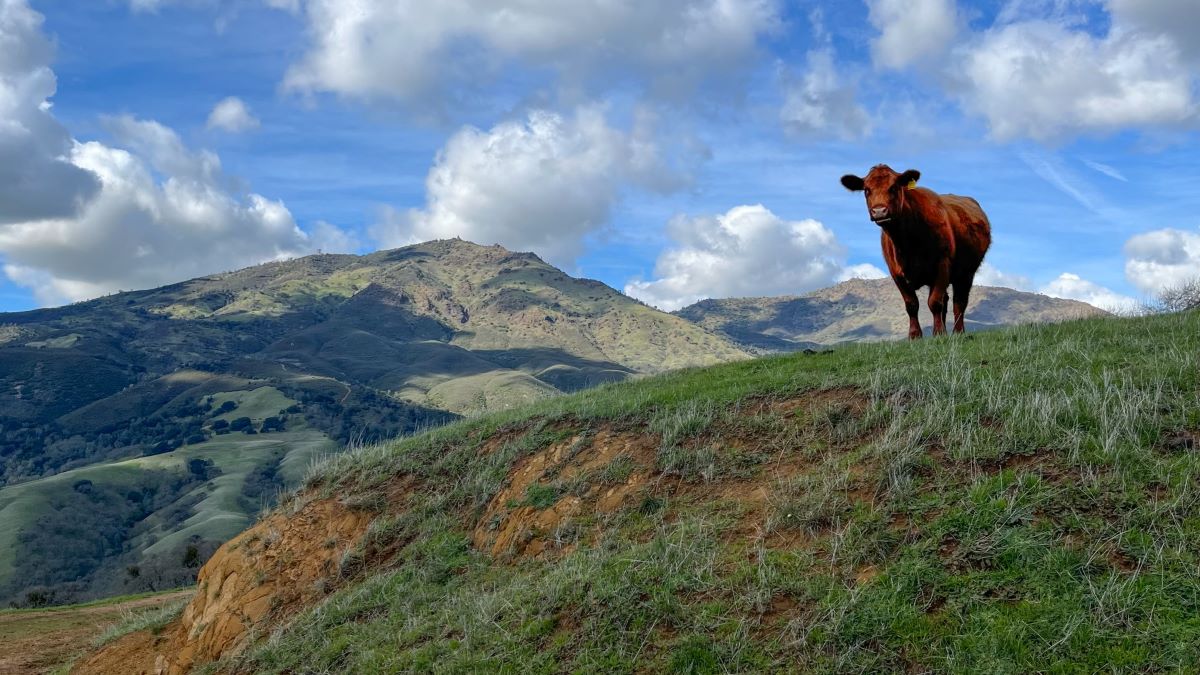
Photo by Sean Burke
Where appropriate, cattle and sheep grazing is employed on Save Mount Diablo properties to manage fuels and enhance grasslands. Not only do grazing animals keep down non-native annual grasses that are highly flammable during the summer months, they can add greatly to the species diversity, health, and vitality of California rangeland ecosystems.
Integrated Pest Management (IPM)
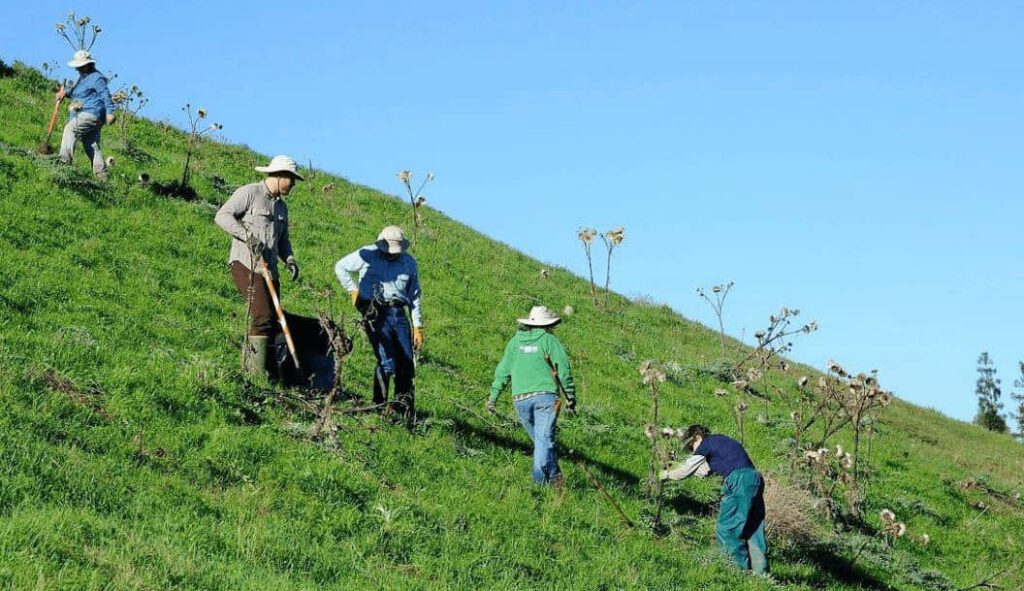
One way stewards maintain biodiversity on Save Mount Diablo lands is by targeting non-native and invasive species with an integrated pest management (IPM) approach. Through a combination of monitoring and treatment methods, stewards target the most detrimental species and prioritize a mechanical strategy. We only use a chemical approach when absolutely needed. For example, we don’t use rodenticides; we do support raptor recovery instead.
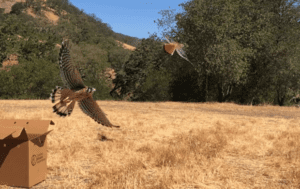 Wildlife Releases
Wildlife Releases
We collaborate with Lindsay Wildlife Experience and The Kestrel Campaign to rehabilitate and release wildlife on our properties and on public lands to build up listed and sensitive wildlife species, including American kestrels, western screech owls, ground squirrels, and merlin.
Fire Abatement
Stewardship staff performs fuels management activities on properties on an annual basis. Fire is a natural part of the California landscape, however, creating firebreaks along fence lines and defensible space around structures is a best management practice.
Fire prevention is one way to ensure that wildlife habitat and other natural resources are maintained on Save Mount Diablo properties and neighboring parcels.
Partnerships with Agencies and Local Landowners
We partner with California State Parks, the East Bay Regional Park District, East Contra Costa County Habitat Conservancy, US Fish and Wildlife, California Department of Fish and Wildlife, Mt. Diablo Resource Recovery, CASS, and other agencies and businesses, as well as local landowners, to help achieve local conservation goals through best management practices.

Before and after comparison of painting over graffitied rocks in Pine Canyon. Photos by Bob Cooper.
Getting Involved
We Need Boots on the Ground
With a land bank of about 2,000 acres and three stewardship staff, we depend greatly on the “boots on the ground” work that stewardship volunteers perform—including two workdays per month on rotating properties, mowing firebreaks in the spring, monthly property monitoring visits, and specific projects to steward the land.
Join our stewardship efforts, such as:
- Save Mount Diablo Property Stewards help manage the land.
- The Diablo Restoration Team (DiRT) helps restore properties so they can be turned over to park systems for public access. Volunteers weed, water, plant, clean, and build.
- Eagle Scouts help us with projects such as installing picnic tables, benches, bridges, gates, and shade structures.
Corporate and community groups can also get involved.
